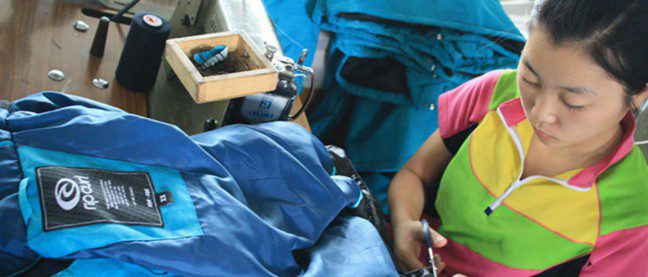Rip Curl describes itself as the ultimate surfing company for ‘the Crew on the search’. But a recent report by Fairfax Media seems to have sparked some very necessary soul searching at the heart of the company.
According to reports, Rip Curl produced their 2015 Mountain-Wear clothing under harsh working conditions near the North Korean capital, Pyongyang, while labelling the clothes as ‘Made in China.’
Rip Curl issued a statement that said: “This was a case of a supplier diverting part of their production order to an unauthorised subcontractor… We do not approve or authorise any production of Rip Curl products out of North Korea.”
But there is no excuse for any company to be unaware of what is happening in its own supply chain. Companies are responsible for human rights abuses within their businesses — not only morally, but also within international human rights frameworks — like the United Nations Guiding Principles on Business and Human Rights.
In an encouraging about-face on Sunday afternoon, Rip Curl apologised on its Facebook page and recognised the founders and directors of Rip Curl have ‘full responsibility for this screw up.’
“[This] screw up is our responsibility to prevent and we are doing everything in our power to make sure it does not happen again. We don’t like the abuse of people in their jobs in any country … and apologise wholeheartedly for letting this happen in the first place.”
Saying sorry is just the first step
Rip Curl’s acceptance of responsibility is a welcome first step towards the kind of labour practises that Australians are demanding. The next step is transparency.
While some big brands like Kmart and Target have published the names and locations of their supplier factories, Rip Curl has not made this sort of information public. Australians have no access to details on Rip Curl’s policies to ensure fair working conditions and worker safety in their factories, let alone the names and locations of these factories.
Perhaps even more importantly, without this information being public, workers and the organisations that represent them can’t easily raise problems like low wages or safety concerns with the company — making it harder for problems to be addressed.
All in all, Rip Curl had a bad news weekend. The good news is that it has become clearer that no company is too big, or has too much cultural credence to ignore their consumers or their responsibilities.
Now is a great time for Rip Curl to take the next step. The search may be on, but it needs to include transparency.
Oxfam has contacted Rip Curl to discuss this issue further including how it could improve its transparency. We’ll keep you up-to-date on what happens next.
Want to know how other Aussie brands rate when it comes to transparency and worker safety? Check out Oxfam’s shopping guide from December 2015: The Aussie brands dodging workers’ rights.

